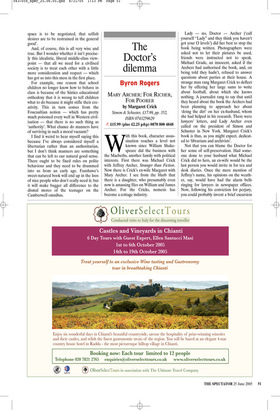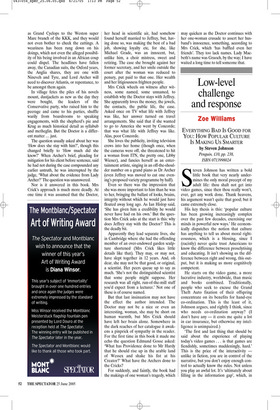The Doctor’s dilemma
Byron Rogers
MARY ARCHER: FOR RICHER, FOR POORER by Margaret Crick Simon & Schuster, £17.99, pp. 352, ISBN 0743259629 ✆ £15.99 (plus £2.25 p&p) 0870 800 4848 With this book, character assassination reaches a level not known since William Shakespeare did the business with the Macbeths, another family with political interests. First there was Michael Crick with Jeffrey Archer, Stranger than Fiction. Now there is Crick’s ex-wife Margaret with Mary Archer. I see from the blurb that there is a daughter, who presumably even now is amassing files on William and James Archer. For the Cricks, nemesis has become a cottage industry. Lady — no, Doctor — Archer (‘call yourself “Lady” and they think you haven’t got your O levels’) did her best to stop the book being written. Photographers were asked not to let their pictures be used, friends were instructed not to speak. Michael Grade, an innocent, asked if the Archers had authorised the book, and, on being told they hadn’t, refused to answer questions about parties at their house. A strange man rang Margaret Crick to deflect her by offering her large sums to write about football, about which she knows nothing. A journalist rang to say that until they heard about the book the Archers had been planning to approach her about ‘doing the dirt’ on her ex-husband, whom she had helped in his research. There were lawyers’ letters, and Lady Archer even called on the president of Simon and Schuster in New York. Margaret Crick’s book is thus, as you might expect, dedicated to ‘librarians and archivists’.
Not that you can blame the Doctor for her sense of self-preservation. Had someone done to your husband what Michael Crick did to hers, an ex-wife would be the last person you would invite in for tea and desk diaries. Once the mere mention of Jeffrey’s name, his opinions on the weather, say, would have had the alarm bells ringing for lawyers in newspaper offices. Now, following his conviction for perjury, you could probably invent a brief excursion as Grand Cyclops to the Weston super Mare branch of the KKK, and they would not even bother to check the cuttings. A weariness has been rung down on his doings, which not even the alleged possibility of his being involved in an African coup could dispel. The headlines have fallen away, the Canadian suits, the Oxford years, the Anglia shares, they are one with Nineveh and Tyre, and Lord Archer will need to discover Atlantis, or repentance, to be amongst them again.
In village fetes the piles of his novels mount, dustjackets as new as the day they were bought, the leaders of the Conservative party, who raised him to the peerage and came to his parties, shuffle warily from boardrooms to speaking engagements, with the shepherd’s pie and Krug as much historical detail as syllabub and metheglin. But the Doctor is a different matter ... just.
The question usually asked about her was ‘How does she stay with him?’, though this changed briefly to ‘How much did she know?’ When Archer’s brief, pleading for mitigation for his client before sentence, said he had not during the case compounded any earlier untruth, he was interrupted by the judge, ‘What about the evidence from Lady Archer?’ The question was unanswered.
Nor is it answered in this book. Mrs Crick’s approach is much more deadly. At one time it was assumed that the Doctor, her head in scientific air, had somehow found herself married to Jeffrey, but, having done so, was making the best of a bad job, showing loyalty etc, for she, like Michael Grade, was an innocent, but, unlike him, a choir mistress, sweet and retiring. The case she brought against her former secretary, and her smile outside the court after the woman was reduced to penury, put paid to that one. Her wealth and her litigiousness frighten people.
Mrs Crick wheels on witness after witness, some named, some unnamed, to establish why the Doctor stays with Jeffrey. She apparently loves the money, the jewels, the contacts, the public life, the ease. Asked once on TV what life with Jeffrey was like, her answer turned on travel arrangements. She said that if she wanted to go to America she went by Concorde; that was what life with Jeffrey was like. Alas, poor Concorde.
She loves the publicity, inviting television crews into her home (though once, when the cameras were off, she threatened to hit a woman from ITN, the pretty one, Libby Wiener), and fancies herself as an entertainment artiste, singing in an off-the-shoulder number on a grand piano as Dr Archer (even Jeffrey was moved to cut one evening’s proposed variety programme by half).
Even so there was the impression that she was more important to him than he was to her, bringing the ballast of looks, brains, integrity without which he would just have floated away long ago. As Ian Hislop said, ‘She has given him a credibility he would never have had on his own.’ But the question Mrs Crick asks at the start is this: why does Jeffrey stay with the Doctor? This is the deadly bit.
Apparently they lead separate lives, she in Cambridge where she had the offending member of an over-endowed garden sculpture shortened (Mrs Crick likes little details like that). They may, or may not, have slept together in 12 years. And, oh dear, she may not be that good, or original, a scientist. Her peers queue up to say as much. ‘She’s not the distinguished scientist that some people might suppose. Her research was all right, run-of-the-mill stuff you’d expect from a lecturer.’ Not one of these is of course named.
But that last insinuation may not have the effect the author intended. The Doctor may not be a nice or even an interesting, woman, she may be short on human warmth, but Mrs Crick should have left her brain alone. Somewhere in the dark reaches of her catalogue it awakens a pinprick of sympathy in the reader. For the first time in this book it made me echo the question Edmund Gosse asked: ‘What has Providence done to Mr Hardy that he should rise up in the arable land of Wessex and shake his fist at his Creator?’ What have the Archers done to the Cricks?
For suddenly, and faintly, the book had the makings of one woman’s tragedy, which may quicken as the Doctor continues with her one-woman crusade to assert her husband’s innocence, something, according to Mrs Crick, which ‘has baffled even her friends’. They too lack names. Lady Macbeth’s name was Gruoch, by the way; I have waited a long time to tell someone that.



































































 Previous page
Previous page